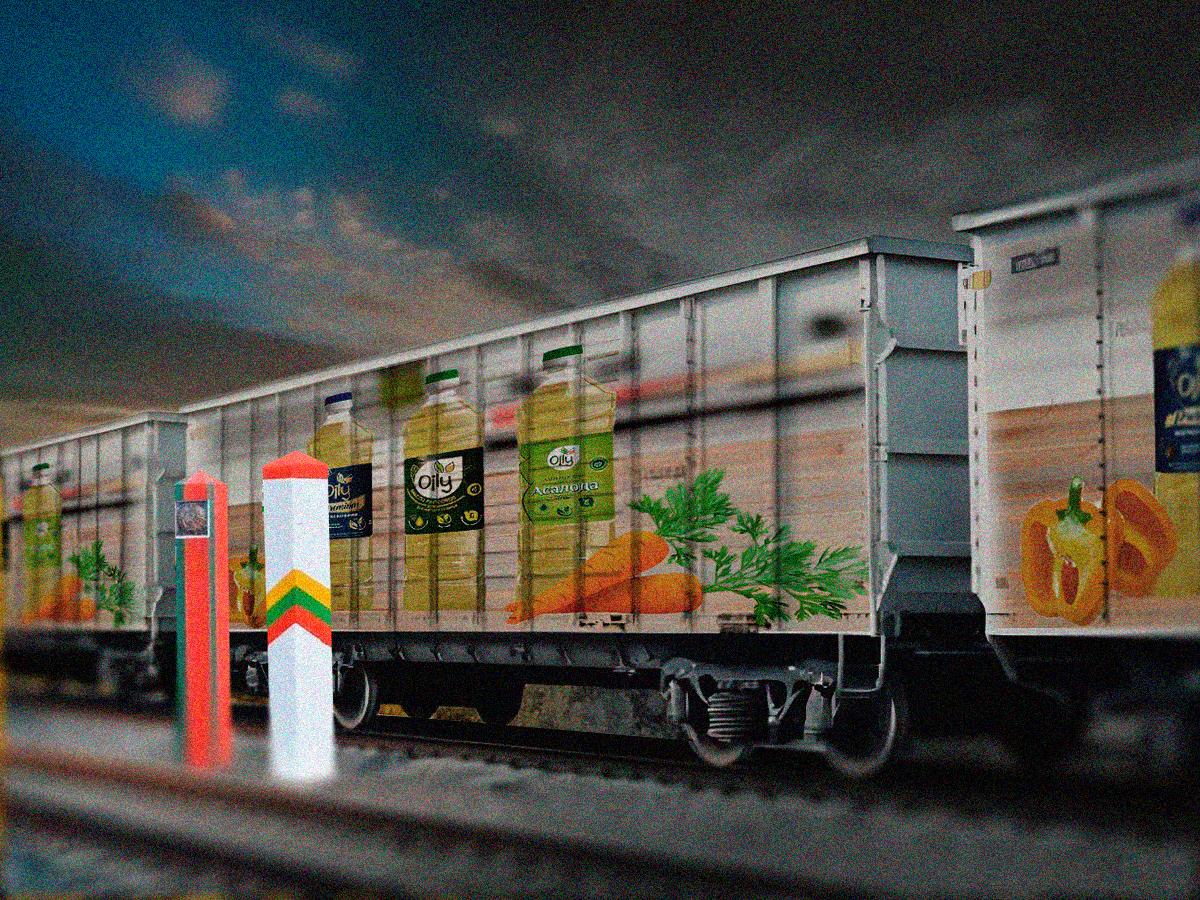This investigation reveals a concerning supply chain where rapeseed from occupied Ukrainian territories is being processed in Belarus and sold to the EU. Here are the key findings:
The Belarusian company Agroprodukt is:
- Processing rapeseed from occupied Ukrainian territories (specifically Kherson region)
- Selling the resulting oil to EU countries
- Linked to a company sanctioned by Ukraine for helping transport Russian military equipment
The scale is significant:
- EU purchased 90,400 tons of rapeseed oil worth €67.7 million from Belarus in first half of 2024
- This is 4 times more volume than all of 2021
- Main buyers are Lithuania, Latvia and Poland
The scheme works through:
- Russian companies supplying Ukrainian rapeseed to Belarus
- Belarusian processing into oil
- Various logistics companies helping circumvent restrictions
- Transit through Baltic ports
Key concerns:
- The beneficial owner is under sanctions for aiding Russia
- The company uses raw materials from occupied territories while having ISO certification requiring transparency
- Several EU companies continue imports despite origin concerns
- Complex schemes exist to bypass Lithuanian import restrictions
The investigation was conducted in partnership with Lithuanian publication 15min.lt, Latvian TV channel TV3, and Ukrainian project Skhemy, with support from activist groups including CyberPartisans.
This is part of a larger series investigating illegal transfer and processing of agricultural products from occupied Ukrainian territories.
This investigation was carried out in partnership with the Lithuanian publication 15min.lt, the Latvian TV channel TV3, and the Ukrainian investigative project Skhemy with the support of activist group CyberPartisans, the Community of Railway Workers of Belarus and the Ukrainian hacker community KibOrg.
This is the third part of an investigation into the illegal transfer, processing and export of agricultural products from occupied Ukrainian territories. In the first one, the BIC told how wheat from the Kherson region went to Azerbaijan and Turkey, barley to Iran, corn to Syria, and peas from Crimea to Spain. The second one focused on the supply of rapeseed to Belarus for processing. This part focuses on selling Belarusian rapeseed oil, produced from Ukrainian raw materials, and the importers in the EU.
In the past five years, rapeseed farmers have expanded the sown area and improved the average crop yield. In 2019, it averaged 16.8 centners per hectare, rising to 24.8 centners in 2024. (A centner is about 100 kilograms or 220 pounds.)
In the past five years, rapeseed processing in Belarus has increased 1.4 times from 417,000 tons in 2019 to 578,000 in 2023.
Cultivating this highly profitable oilseed crop in Belarus is not based solely on increased demand in the domestic market.
“Today, even amongst these wild sanctions, Europe asks: ‘Give us rapeseed oil!’” President Aleksandr Lukashenko said in June 2022 during a working trip to the Mahilou region in eastern Belarus.
Demand for Belarusian rapeseed oil in the European Union increased following Russia's full-scale invasion of Ukraine. Earlier sanctions did not affect domestic food products, and until mid-2024 they could be imported into the EU without hindrance.
On July 1, 2024, the European Commission introduced prohibitive duties on the import of grain, oilseeds, and their processed products from Russia and Belarus into the European Union.
This measure was intended to stop the import of these products into its territory.
According to Eurostat statistics, EU countries purchased 90,400 tons of rapeseed oil from Belarus worth €67.7 million in the first half of 2024. That is four times more volume and 2.6 times more money than for all of 2021, when 22,600 tons were imported worth €25.7 million. The main buyers are Lithuania, Latvia and Poland. [*] [*]
The Belarusian oil and fat industry has been doing well in foreign markets in recent years, as evidenced by the success of individual enterprises. One of the flagship enterprises — OOO Agroprodukt from the Brest region — nearly doubled its export of rapeseed oil to the EU from 2021 to 2022, state media reported, citing the regional executive committee.
In the first 9 months of 2024, Agroprodukt earned 523 million Belarusian rubles (almost $161 million).
Revenue was: 673 million rubles (nearly $224 million) for all of 2023 and 681.4 million (nearly $260 million) in 2022. In 2021,revenue was almost 540.2 million rubles (about $212.7 million). [*] [*]
It would seem logical — the more we grow, the more we produce, the more we sell. But what BIC discovered is that not all Belarusian oil sold to the European Union is made from Belarusian rapeseed.
Certified fraud
Despite record-breaking oilseed harvests in Belarus, Agroprodukt director Aleh Tsiasliuk told journalists in August 2023 that the company was running short of raw materials:
“We need over 300,000 tons of rapeseed per year, and all of Belarus produces about 900,000 tons. There are a lot of processors, and everyone needs it. So about 30% of the required amount has to be purchased from neighbours. Rapeseed was previously brought from Ukraine and Russia, but now only Russian supplies remain."
Agroprodukt still has Russian suppliers. But Tsiasliuk remained silent about where Russia gets the rapeseed that it then sells to Belarus. In 2023, Agroprodukt purchased oilseeds grown in the occupied portion of Ukraine’s Kherson region. In August alone, Agroprodukt received 728 tons of raw materials from Kherson. The BIC learned this in data from the “Grain” Federal State Information System, which was provided by Ukrainian hackers from KibOrg.
Russian companies Veles-Agro and Agrotrade supply Kherson rapeseed to Agroprodukt. Agrotrade is linked to the family of Anton Tikhomirov, former secretary of the Yalta branch of the United Russia Party, who collaborated with the Russian administration in annexed Crimea. [*] [*]
Could Agroprodukt not know about the origin of raw materials it purchased? It is unlikely. The accompanying shipping documents indicate the Russian Federation as the departure address, but the region is listed as Kherson, Ukraine. [*] [*]
Agroprodukt supplied the European Union with rapeseed oil, some made using Ukrainian grain. According to the Community of Railway Workers of Belarus, nearly 50,000 tons of Agroprodukt products were delivered to Lithuania and Latvia in 2024. Of these, 30,000 and 2,000 tons, respectively, were intended for those countries' domestic markets.
Agroprodukt has received several certificates of compliance with international quality standards, including ISO 9001. The latter is required for entering European markets and involves fully informing buyers or end consumers on the quality of the product or service and production processes. A mandatory condition is complying with "all applicable legislative and regulatory requirements". ISO certification is voluntary. But it influences the choice of the company by foreign partners, as it testifies to its business reputation and compliance with ethical standards. [*] [*]
‘It’s not banned, so we import them’
According to Latvian Public Media (Latvijas Sabiedriskais medijs, LSM), four companies import Agroprodukt-made rapeseed oil to Latvia. One is logistics company K.I.F. A source from the Community of Railway Workers of Belarus confirmed that K.I.F.'s turnover increased from €1 million in 2021 to €2.3 million in 2023. [*]
Journalists from Latvian TV channel TV3 visited K.I.F.’s office and asked if the company imports products from Belarusian Agroprodukt.
“No, we don't import them. We act as customs brokers, as freight forwarders," the representative answered. He did confirm K.I.F cooperates with Agroprodukt and provides logistics services. K.I.F. said they do not have any Latvian clients who order rapeseed oil: "An Estonian company does it, and then they send it on."
K.I.F. speaks openly about deliveries of Belarusian goods: where there is no EU ban, they import. K.I.F. say they check the origin of products, and if the manufacturer is on a sanctions list. they will not work with it. K.I.F. did not know that Agroprodukt oil could be made using rapeseed from the occupied territories of Ukraine, said a company representative: “We have no information that the imported product from Belarus was produced in the occupied territories. Of course, this is important.”
According to official Eurostat statistics, almost 68,890 tons of rapeseed oil from Belarus were imported into Latvia in the first six months of 2024.
In response to a request from TV3 journalists, Latvian Railway company (Latvijas dzelzceļš, LDz) confirmed that Agroprodukt exported rapeseed oil in 2021-2024. An investigation conducted by the LDz sanctions department concluded that neither rapeseed oil itself, nor Agroprodukt, nor the company’s managers are under sanctions, the letter says. It also provides supply details:
“The goods from Agroprodukt are mainly received by two forwarders: SIA LAT FLEX and SIA K.I.F., which ensure further transportation of the goods to China and Israel. The products manufactured by the Belarusian company are also transported to many European countries: Belgium, the Netherlands, Poland, Lithuania, Estonia, etc”. [*]
Transit permitted
Until June 2024, Lithuania also imported Belarusian rapeseed oil. According to the Community of Railway Workers of Belarus, it was transported by local companies Baltijos Pervezimai, GEN Cargo, and Baltic Cargo Agent. Since June 2024, Lithuania has imposed a ban on the import of agricultural products and livestock feed from Russia and Belarus. However, the transit of these products through the territory of Lithuania is still permitted , which makes it possible to circumvent the restrictions.
Journalists from the 15min.lt publication, posing as potential buyers, spoke with the Lithuanian Baltijos Pervezimai sales manager. She confirms the company transports goods and cooperates with Agroprodukt. She explained how to circumvent the Lithuanian ban on importing Belarusian products by delivering them not directly to Lithuania but through Latvia:
“The terminals in Riga accept (the goods), and there are no problems there. Since it is a food product, it is not subject to sanctions.”
Olga Troitskaya, CEO of Baltijos Pervezimai, explained the approval and transportation process in an official response to a joint request from the BIC and 15min.lt. To transport food cargo from Belarus by rail through Lithuania, the sender must submit an application to LTG Cargo, a subsidiary of state-owned Lietuvos Geležinkeliai LTG. If the application passes the sanctions filter and LTG Cargo approves it, a transportation process from Belarus to Israel via the Lithuanian port of Klaipeda could be arranged. The forwarder temporarily becomes the consignee. The response also stated that although Agroprodukt is not under sanctions, Baltijos Pervezimai is suspending approval of new applications for shipments to perform a risk assessment, including with Lithuanian customs. [*] [*]
The Lithuanian logistics company Baltic Cargo Agent also confirmed they are cooperating with Agroprodukt: “We have contracts with them. We provide them with logistics services to the port of Klaipeda, and we are also partially engaged in transportation to the port of Riga.”
Another company, TLSC, mentioned a scheme for bypassing Lithuania's restrictions on the import of rapeseed oil from Belarus in a conversation with 15min.lt journalists. It is associated with another importer of Agroprodukt oil, GEN Cargo (the latter is owned by UAB G 7 Plus, a company whose owners also control TLSC — more details on this below).
“There are specific conditions (for clearing goods through customs). You can't do this in Lithuania. In theory, butter can be imported to Lithuania, but the approval process is complicated…You'll need to import it to Latvia or Poland. This can be done if you have a company there. There will be customs duties and other subtleties, including the product code. I'm not privy to the details, but there is a working scheme by which certain companies operate."
Who’s the fall guy?
According to a BIC source from the rail transport sector, not only did GEN Cargo circumvent the Lithuanian ban via Latvia, it also continued to supply Agroprodukt goods to Lithuania directly. According to our source, in October-December 2024, GEN Cargo received 177 tanks of rapeseed oil (about 10,000 tons). According to a source at LTG Cargo, GEN Cargo transported 120 railcars of rapeseed oil from a Belarusian supplier during the same period.
GEN Cargo delivers cargo from Agroprodukt to the Klaipeda port. A terminal officer confirmed this to Lithuanian journalists. It is possible that GEN Cargo only acts as a forwarder for another Lithuanian company, a subsidiary of Lithuanian Railways, LTG Cargo. We noticed LTG Cargo in invoices for the company Tekhnospetstreiding when we were investigating the transportation of nitrogen fertilizers to Lithuania. At the time, Tekhnospetstreiding supplied fertilizers from the Grodno-Azot enterprise to Europe to circumvent sanctions, with LTG Cargo acting as a carrier. [*]
Until 2022, Mantas Bartuška was listed as a board member of LTG Cargo. At the same time, he held the post of head of Lietuvos geležinkeliai (Lithuanian Railways). He later resigned following the outbreak of the full-scale war in Ukraine and a controversy involving sanctions circumvention (Lietuvos geležinkeliai continued to transport Belarusian fertilizers after the US imposed sanctions on Belaruskali). Bartuška’s place was taken by Egidijus Lazauskas, director of LTG Cargo. [*] [*] [*]
In an official response to 15min.lt journalists, a representative of Lietuvos geležinkeliai wrote that their subsidiary LTG Cargo does not have direct contract relations with Agroprodukt, and that Agroprodukt’s products were transported by third-party customer companies. The letter also states that the Lithuanian railway company has launched an internal investigation and has temporarily suspended deliveries from Agroprodukt:
“Although the requirement to confirm the origin of raw materials for goods under the EU Regulation (when importing into the EU from third countries) only applies to metal products, we have initiated a detailed re-examination...If the internal investigation reveals any suspicious factors, we will forward the information to the relevant law enforcement agencies." [*]
The Community of Belarusian Railway Workers received information from its sources that two wagons with rapeseed oil produced by Agroprodukt were detained at the Lithuanian Kena railway station on the border with Belarus.
The right connections
The BIC found that Lithuanian companies that import rapeseed oil produced by Agroprodukt have business links to Belarus. They could help to build up supplies by getting around the bans. For example, GEN Cargo is owned by UAB G 7 Plus shareholders. [*] [*] [*] [*] [*] They also own OOO Kargotek in Belarus, which has transported MTZ tractors to Sudan, Cambodia and Egypt. [*] [*] They also own the transportation and logistics company TLSC. [*] Apart from Lithuania, Latvia and Poland, the company has branches in the territory of Russia, Kazakhstan and Belarus. [*] [*] [*] [*] [*] Anton Shmygov, a former Belarusian foreign ministry official, owns the Russian branch. [*] [*] [*] His brother Alexei Shmygov is a shareholder of GEN Cargo. [*] [*]
Mantas Bartuška, a former board member of LTG Cargo and head of Lithuanian Railways, was also linked to TLSC through a network of companies.
He is a member of the Board of Directors and co-owner of UAB JES RAIL through MB Capital. UAB JES RAIL is co-owned by UAB BV Capital. BV Capital co-founded G 7 Plus, which established GEN Cargo. [*] [*]
Another example is the company Baltijos Pervežimai. It is co-owned by Larisa Sabatina-Berger, whose husband, Grigorij Sabatin, co-owns a large logistics company in Belarus, SOOO Railport. [*] [*] [*] [*] Konstantin Samarskov, a Lithuanian Baltic Cargo Agent co-owner, also has OOO Gruzovoy Agent registered in Belarus. [*] [*] [*] Another of his Lithuanian companies, Zetemžėja, was named by the media in 2024 as being involved in supplying American microchips to Russia in circumvention of sanctions.
An accomplice of the aggressor
The rapeseed oil producer Agroprodukt is linked to Ukraine not only through the purchase of oilseeds exported from the Kherson region. The Ukrainian authorities accused a company directly linked to this one of having been involved with the Russian Army.
OOO Agroprodukt is 70% owned by the Belarusian company Tranzit-Avto 2003. [*] [*] [*] On January 28, 2023, Ukrainian President Volodymyr Zelenskyy signed a decree imposing sanctions on 185 legal and natural persons used by the aggressor country to transport military equipment and personnel by rail. Among them is Tranzit-Avto 2003. [*] [*]
We have requested the Security Service of Ukraine to find out where and under what circumstances this company transported Russian military personnel or military equipment. At the time of publication, no response had been received.
Despite its links to a sanctioned company in Ukraine and its purchases of rapeseed from the occupied territories, Agroprodukt is not on either the Ukrainian or European sanctions lists. Thanks to this, the company, which buys rapeseed from Russia, including from the occupied territories of Ukraine, can also conclude contracts with companies in Ukraine. From the quality certificates obtained by Agroprodukt, we learned that Ukrainian companies have been selling rapeseed and soybeans to the company since March 2022.
Like a shot
In Belarus, Agroprodukt may have high-profile patrons. Aleh Tsiasliuk, director and co-founder of the company, was, until recently, a deputy of the Brest Regional Council of Deputies. In an interview with the information portal kamenec.by in the summer of 2021, he said:
“I am known to the authorities, and I can contact them and pass on people’s requests with the knowledge that they will be taken into account”.
During Tsiasliuk’s term as a deputy, Agroprodukt received state support from the Brest Regional Executive Council. The government has undertaken to reimburse part of the interest payments on its loans. [*]
Tsiasliuk is well acquainted with district and regional officials. Former Kamianets district chief Andrei Pisaryk now works as Agroprodukt’s deputy director. [*] [*] [*] In May 2018, Tsiasliuk and Pisaryk travelled together by car to Lithuania. [*] Two months later, Tsiasliuk travelled to Ukraine with the former governor of the Brest region, Kanstantsin Sumar. In those days, the latter was a member of the board of directors of the company Russkoye More, owned by Alexander Moshensky, Lukashenko’s “money bag”. [*] [*] [*]
Aliaksandr Zaitsau, an employee of the Presidential Property Management Department of Belarus (sharing a name with a businessman and another “moneybag” of Aleksandr Lukashenko), also held a position at Tranzit-Avto 2003. Its owner, Aliaksei Shvedau, often travelled to Ukraine by car with Zaitsau. [*] [*] [*] [*]
We asked Agroprodukt to comment on the facts stated in the investigation. At the time of publication, we had not received a response. Aleh Tsiasliuk, the company’s director, told a BIC journalist over the phone that our information about the company’s purchase of rapeseed from the occupied territories of Ukraine was incorrect, before hanging up. Aliaksei Shvedau, co-owner of Agroprodukt, also declined to comment.







